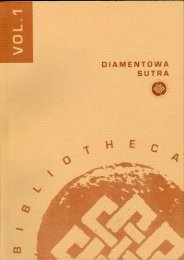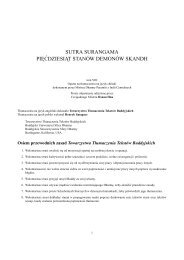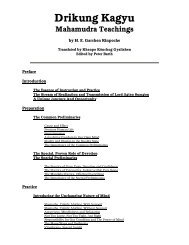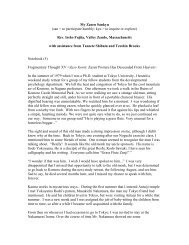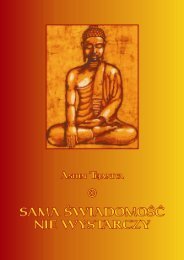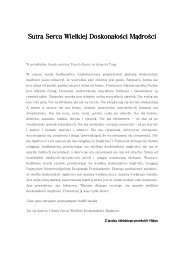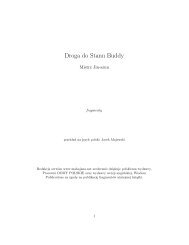3 - Computing in the Humanities and Social Sciences
3 - Computing in the Humanities and Social Sciences
3 - Computing in the Humanities and Social Sciences
You also want an ePaper? Increase the reach of your titles
YUMPU automatically turns print PDFs into web optimized ePapers that Google loves.
However, scholars have also proposed a different approach from Staal’s.<br />
Accord<strong>in</strong>g to it, everyth<strong>in</strong>g that is part of a culture is significant, <strong>and</strong> can be<br />
<strong>in</strong>terpretable <strong>and</strong> explicable. In a semiotic perspective, <strong>in</strong> fact, <strong>the</strong>re are no entities that<br />
can be characterized a priori as signs or as significant. On <strong>the</strong> contrary, any object can<br />
become a sign of someth<strong>in</strong>g else to someone under “some respect or capacity,” as <strong>the</strong><br />
well-known def<strong>in</strong>ition by Peirce puts it. In <strong>the</strong> same way, mantras can be regarded as<br />
signs, <strong>and</strong> <strong>the</strong>refore as <strong>in</strong>terpretable cultural entities. More specifically, mantras must<br />
have been created with special purposes <strong>and</strong> significative goals. A possible objection to<br />
this st<strong>and</strong>po<strong>in</strong>t is that <strong>the</strong> listeners (<strong>in</strong>clud<strong>in</strong>g many officiants) of mantric expressions<br />
almost never underst<strong>and</strong> <strong>the</strong>ir mean<strong>in</strong>g. Now, as Wittgenste<strong>in</strong> argued, <strong>the</strong> mean<strong>in</strong>g of<br />
l<strong>in</strong>guistic expressions is <strong>the</strong>ir use, <strong>the</strong>refore it is not necessary to underst<strong>and</strong> <strong>the</strong><br />
mean<strong>in</strong>g of an expression <strong>in</strong> order to use it correctly. However, we can also argue that<br />
users of mantras believe that mantras have a mean<strong>in</strong>g, even though <strong>the</strong>y do not know it.<br />
In o<strong>the</strong>r words, <strong>the</strong> epistemes of cultures employ<strong>in</strong>g mantras assume that mantras have<br />
mean<strong>in</strong>g. In fact, many esoteric texts presuppose a model-reader who is able to<br />
underst<strong>and</strong> <strong>the</strong> mean<strong>in</strong>gs of mantras. As Stanley Tambiah has written <strong>in</strong> a different<br />
context, <strong>the</strong> structure of <strong>the</strong> expression of “magic” formulas <strong>and</strong> <strong>the</strong>ir mean<strong>in</strong>g<br />
must of course be separated from <strong>the</strong> problem of whe<strong>the</strong>r <strong>the</strong> exorcist<br />
actually underst<strong>and</strong>s all <strong>the</strong> words conta<strong>in</strong>ed <strong>in</strong> <strong>the</strong> spell. From his, as<br />
well as <strong>the</strong> audience’s, po<strong>in</strong>t of view, <strong>the</strong> spells have power by virtue of<br />
<strong>the</strong>ir secrecy <strong>and</strong> <strong>the</strong>ir capacity to communicate with demons <strong>and</strong><br />
<strong>the</strong>reby <strong>in</strong>fluence <strong>the</strong>ir actions. However, mantra do not fall outside <strong>the</strong><br />
requirements of language as a system of communication, <strong>and</strong> <strong>the</strong>ir<br />
<strong>in</strong>telligibility to humans is not <strong>the</strong> critical factor <strong>in</strong> underst<strong>and</strong><strong>in</strong>g <strong>the</strong>ir<br />
logic (Tambiah 1985: 21; see also Tambiah 1970: 195-222).<br />
In o<strong>the</strong>r words, correct usage <strong>and</strong> shared assumptions about <strong>the</strong>ir validity as<br />
communication tools should be enough to consider mantras as endowed with l<strong>in</strong>guistic<br />
nature; as such, <strong>the</strong>y should also be endowed with signification (<strong>the</strong> signification of <strong>the</strong><br />
mantric expressions will be <strong>the</strong> subject of <strong>the</strong> next lecture).<br />
The Japanese case is more complex than <strong>the</strong> Indian one, for <strong>the</strong> reason that mantras<br />
are elements from a foreign culture, with a different phonological system, specific ritual<br />
uses, <strong>and</strong> mean<strong>in</strong>gs that require <strong>in</strong>itiation (for example, even those mantras that <strong>in</strong><br />
14



![Shushogi, Dogen Zenji [PDF] - Mahajana.net](https://img.yumpu.com/50921105/1/190x219/shushogi-dogen-zenji-pdf-mahajananet.jpg?quality=85)

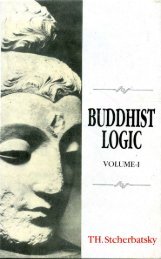
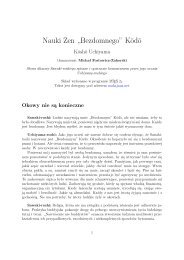
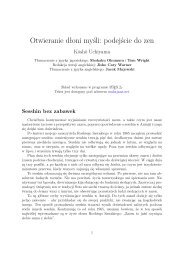
![wywiadu z Murakami Kosho Roshim [PDF] - Buddyzm w Polsce i na ...](https://img.yumpu.com/45809746/1/184x260/wywiadu-z-murakami-kosho-roshim-pdf-buddyzm-w-polsce-i-na-.jpg?quality=85)
